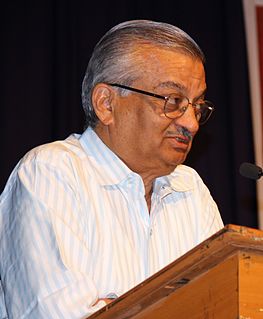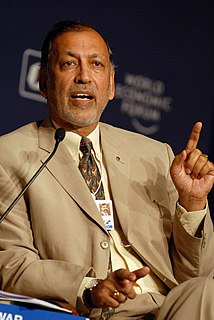
The Padma Vibhushan is the second-highest civilian award of the Republic of India, second only to the Bharat Ratna. Instituted on 2 January 1954, the award is given for "exceptional and distinguished service", without distinction of race, occupation, position, or sex. The award criteria include "service in any field including service rendered by Government servants" including doctors and scientists, but excluding those working with the public sector undertakings. Up to january 2020, the award has been bestowed on 314 individuals, including 16 posthumous and 21 non-citizen recipients.
The Padma Bhushan is the third-highest civilian award in the Republic of India, preceded by the Bharat Ratna and the Padma Vibhushan and followed by the Padma Shri. Instituted on 2 January 1954, the award is given for "distinguished service of a high order...without distinction of race, occupation, position or sex." The award criteria include "service in any field including service rendered by Government servants" including doctors and scientists, but exclude those working with the public sector undertakings. As of 2019, the award has been bestowed on 1254 individuals, including twenty-one posthumous and ninety-six non-citizen recipients.

Arun Jaitley was an Indian politician and attorney. A member of the Bharatiya Janata Party, Jaitley served as the Minister of Finance and Corporate Affairs of the Government of India from 2014 to 2019.

Smriti Zubin Irani is an Indian politician, former model, television actress, and producer. Irani is a Minister in the Union Cabinet of India. She is serving in the cabinet of Prime Minister Modi as Minister of Textiles and was given additional charge as Minister of Women and Child Development in the 2nd cabinet of Modi since May 2019. A prominent leader within the Bharatiya Janata Party, she is a Member of Parliament in the Lok Sabha, representing Amethi.

Anil Kakodkar is an Indian nuclear physicist and mechanical engineer. He was the chairman of the Atomic Energy Commission of India and the Secretary to the Government of India, he was the Director of the Bhabha Atomic Research Centre, Trombay from 1996–2000. He was awarded the Padma Vibhushan, India's second highest civilian honour, on 26 January 2009.

Rajendra Singh Pawar is an Indian businessman and the chairman of NIIT, which he co-founded along with Vijay K. Thadani. He also founded NIIT University, which is a not-for-profit university in Neemrana, in 2009.

Prof. Shantha Sinha is an anti-child labour activist of international reputation. She is the founder of Mamidipudi Venkatarangaiya Foundation, popularly known as MV Foundation, and is a Professor in the Department of Political science in Hyderabad Central University. She headed the National Commission for Protection of Child Rights for two consecutive terms ; The National Commission for Protection of Child Rights (NCPCR) was set up in March 2007 under the Commission for Protection of Child Rights Act, 2005, an Act of Parliament. Professor Sinha was its first chairperson. She was awarded the civilian honour of Padma Shri by the Government of India in 1998.
The Indian Honors System is the system of awards given to individuals for a variety of services to the Republic of India. The categories of awards are as follows -
The Ministry of Women and Child Development, a branch of the Government of India, is an apex body for formulation and administration of the rules and regulations and laws relating to women and child development in India. The current minister for the Ministry of Women and Child Development is Smriti Irani having held the portfolio since 31st May, 2019.

The National Bravery Awards are a set of awards given annually to about 25 Indian children below 16 years of age for "meritorious acts of bravery against all odds." The awards are given by the Government of India and the Indian Council for Child Welfare (ICCW). The award was instituted in 1957
Jaya Arunachalam was an Indian social worker and the founder of Working Women's Forum, a non governmental organization based in the Indian state of Tamil Nadu, working for the welfare of marginalized women. Starting in 1978, she channeled her activities under the aegis of the forum for organizing poor working women and provided them with seed capitals as micro credit, with assistance from banks, to start their own small businesses.

Maharaj Kishan Bhan was an Indian paediatrician and clinical scientist. He received M.B.B.S. Degree (1969) from Armed Forces Medical College, Pune and M.D. Degree from Post Graduate Institute of Medical Education and Research, Chandigarh. He carried out extensive post doctoral research at All India Institute of Medical Sciences in the areas of diarrheal diseases and child nutrition with an emphasis on public health issues. He served as the president of the Jawaharlal Nehru Institute of Postgraduate Medical Education & Research (JIPMER).
Odisha State Child Protection Society(OSCPS) is the technical, fundamental and functional unit of Women & Child Development Department, Government of Odisha, for implementation of Integrated Child Protection Scheme (ICPS). OSCPS has been registered in the year 2009 under Society Registration Act. District Child Protection Units (DCPUs) as the extended bodies of OSCPS, have been constituted to carry out the activities of ICPS at district and sub-district level.

Shobhana Ranade is an Indian social worker and Gandhian, known for her services towards her cause of destitute women and children. The Government of India honoured her in 2011, with the Padma Bhushan—the third highest civilian award—for her services to the society.
Phoolbasan Bai Yadav is an Indian social worker and the founder of the non governmental organization, Maa Bamleshwari Janhit Kare Samiti, known for her efforts towards the development of economically and socially backward women of Chhattisgarh, India. She was honored by the Government of India, in 2012, with the fourth highest Indian civilian award of Padma Shri.. She also acts as a mentor to Vision India Foundation

The National Bal Shree Honour is awarded to creative children in the age group of 9–16 years. National Bal Shree Honour is constituted by National Bal Bhawan, an autonomous body of Ministry of Human Resource Development (India). The Honour includes a plaque, a certificate, educational resources and a cash prize. National Bal Shree Honour is usually awarded by the Minister of Human Resource Development at Vigyan Bhavan in New Delhi.
Chitra Jayant Naik (1918–2010) was an Indian educationist, writer, social worker, the chairperson of the Indian Institute of Education and the expert member of the Planning Commission of India. She was the chairperson of the Non-formal Education Committee set up by the Ministry of Human Resource Development and was a member of the National Literacy Mission. The Government of India awarded her the fourth highest Indian civilian honour of Padma Shri in 1986.

Zaira Wasim is a former Indian actress who worked in Hindi films. The recipient of numerous accolades, including a Filmfare Award and a National Film Award, Wasim was honoured with the National Child Award for Exceptional Achievement by Ram Nath Kovind, the President of India, at a ceremony in New Delhi in 2017.
Dr. Kshama Metre, popularly known as Doctor Didi, is an Indian rural development leader, and a pediatrician, who has led the Chinmaya Organization for Rural Development (CORD) since the founding of its predecessor organization in 1985, and she leads the organization as its National Director. The organization serves the rural areas of India with its unique approach for sustainable and comprehensive community driven integrated development program, under the aegis of the Chinmaya Mission. While holding the directorship of CORD India, she also serves as an adviser to CORD USA, the US wing of the Organization. A recipient of several awards including the Guardian International Development Achievement Award of 2012, she was selected as the Woman of the Year by The Week magazine, in 1993. The Government of India awarded her the fourth highest civilian honor of the Padma Shri, in 2008, for her contributions to society.
Bharat Bhushan Tyagi is an India farmer, educator and trainer from Bulandshahr, Uttar Pradesh, who was awarded the Padma Shri, the fourth highest civilian award in India in 2019. He organises weekly training for farmers at Bulandshahr and has trained over 80,000 farmers. He is also a recipient of Progressive Farmer Award by the Prime Minister, Narendra Modi.












